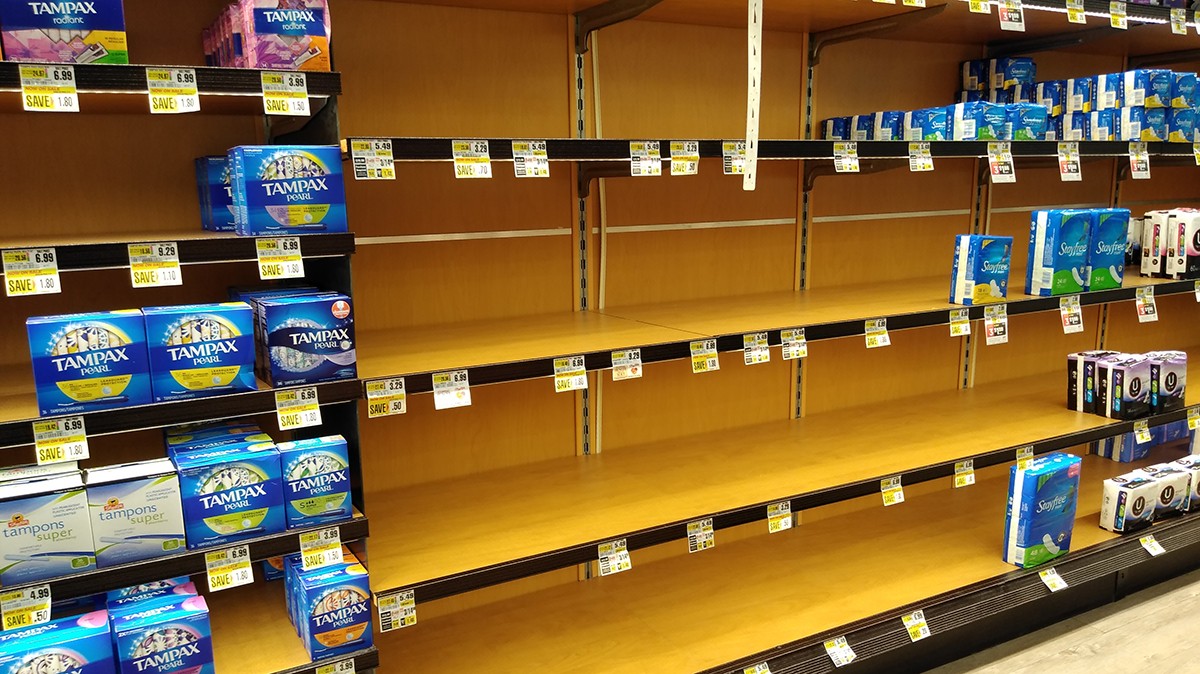Let’s Talk About Menstruation
During a pandemic, women across all socioeconomic backgrounds struggle to access period products, but it is especially challenging for those who have lost employment or housing.

The other day I made a quick visit to my local drugstore and was struck by the sign hanging in front of the sanitary product aisle, “Limit two per person.” I immediately thought of the email I received from a student, who expressed her dismay that tampons and pads seemed to have jumped in price within the space of a week.
I was disheartened but not surprised. The run on toilet paper was public. The chastising not to raise prices on toilet paper was public. In contrast, when it comes to hoarding of menstrual products by those who can afford them or possible price-gauging, silence reigns.
As a colleague articulated in Newsweek recently, “periods don’t stop for pandemics.” And that is the root of the issue. Periods don’t stop. Those who menstruate must, each month, contend with blood flow that will not wait for us to acquire adequate menstrual products—be it a pad, a tampon or menstrual cup—if we cannot afford them or cannot leave our homes to purchase them or receive donated supplies.
I have been working on the issue of menstruation globally since 2004, first focusing on how it creates barriers to schoolgirls in low-income countries without sufficient access to safe, clean toilets; information; and sanitary products. More recently, I began to explore periods in the U.S. context. This included partnering with the Coalition for the Homeless to understand how individuals experiencing homelessness in New York City manage their menstrual needs and working with the city to develop and implement a program that provides free period products in public school bathrooms.
For those who menstruate among the more than 100,000 students who are homeless in the New York public school system, and the 750,000 students living in poverty, free products may no longer be accessible now that they are not in school. This may leave many substituting products for old T-shirts or socks or other rags, which crowded conditions may make difficult to wash and dry hygienically.
For all the Americans who are now struggling—or will be struggling in the months ahead—with diminished or lost paychecks, products will be needed so that they can do their schooling, find work and take care of their families and selves. This will include people who have never struggled before to pay for menstrual products. And the embarrassment for many around speaking openly about menstruation may make asking for help harder.
What can we do to help? Number one is making products more easily accessible, be it at food banks, shelters or other donation centers. We also can lobby manufacturers and distributors to keep tampons and pads well stocked in stores at affordable prices. We can educate the public on this issue and discourage people from hoarding.
Just as important, however, is breaking the silence around periods. For girls, women and all people who menstruate, their sense of self, sense of dignity and ability to participate in life depend on it.

Marni Sommer is an associate professor of sociomedical sciences at Columbia University's Mailman School of Public Health. Her research explores the intersections of gender, health, education and the environment for girls and boys transitioning into adulthood in low-income countries and in the United States. Dr. Sommer has conducted numerous projects and studies on menstruation, including barriers facing schoolgirls and menstruation in humanitarian emergencies, and more recently, on the menstruation-related needs of low-income girls and individuals experiencing homelessness in New York. This column is editorially independent of Columbia News.